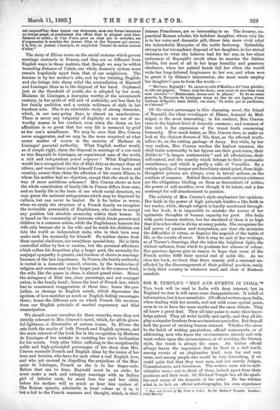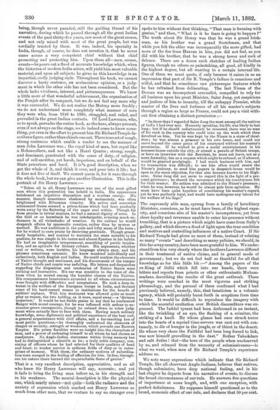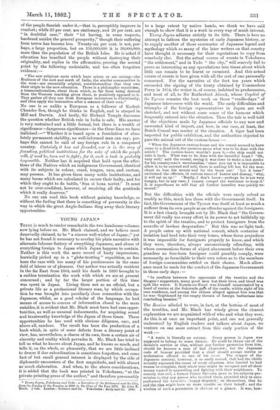SIR R. TEMPLE'S "MEN AND EVENTS IN INDIA."'" Tim book
will be read in India with deep interest, but in England we fear it will cause some disappointment. It is full of information, but it is so annalistic. All official writers upon India, when dealing with her annals, and not with some special point, seem to us to have the same merits and the same defects. They all know a great deal. They all take pains to make their know- ledge patent. They all write lucidly and easily, and they all dis- play a singular freedom from acrimonious prejudice. But they all lack the power of exciting human interest. Whether the cause be the habit of writing passionless, official memoranda, or of addressing men who know the circumstances already and only want orders upon the circumstances, or of avoiding the literary style, the result is always the same. An Indian official always leaves the impression that he lived in a dull world, among events of an elephantine kind, very big and very tame, and among people who would be very interesting, if we could quite feel that they were men, and not merely Judges, Commissioners, and Governors. The writers seem not to indi- vidualise men,—not to think of them, indeed, apart from their positions and their work. Sir Richard Temple has all the quali- ties and many of the demerits of his order, He has written what is, in fact, an official autobiography, his own experience
• Man and Events of My Tinto in lathe. By Sir Richard Temple. London : John Murray.
being, though never paraded; still the guiding thread of his narrative, during which he passed through all the great Indian events of the past thirty-five years, saw most of the great scenes, and not only mixed with most of the great people, but was cordially trusted by them. It was, indeed, his specialty in India, though, of course, he does not mention it, that he never came across a very competent chief without that chief promoting and protecting him. Upon them all—men, scenes, events—he pours out a flood of accurate knowledge which, when the historian of modern India arises, will yield him most valuable material, and upon all subjects he gives us this knowledge in an impartial, coolly judging style. Throughout his book, we cannot discover a hasty sentence, an acrimonious opinion, or a judg- ment in which the other side has not been considered. But the whole lacks vividness, interest, and picturesqueness. We know a little more of that wonderful achievement, the organisation of the Punjab after its conquest, but we do not feel any more why it was successful. We do not realise the Mutiny more freshly; we do not understand more completely what manner of men they were who, from 1848 to 1880, struggled, and ruled, and prevailed in the great Indian contests. Of Lord Lawrence, who, so to speak, pervades the entire book, as the hero, always present, even if not always on the stage, we do indeed come to know some- thing, yet even in the effort to present him Sir Richard Temple de- scribes a figure, rather than chisels one out. There is no set of rough, strong sentences which enable a reader to see the manner of man John Lawrence was ; the royal kind of man, but royal like a Hohenzollern, and not like a Henri Quatre ; strong, rough, and dominant, penetrated with the sense of duty, of religion, and of self-sacrifice, yet harsh, imperious, and on behalf of the State penurious and hard. It is•a good description, when we get the whole of it, and think it over, and pour into it life; but it does not live of itself. We cannot quote it, for it runs through the whole book, but we can give another illustration. This is the portrait of Sir Henry Lawrence :—
" Taken all in all, Henry Lawrence was one of the most gifted men whom this generation has beheld in India. His appearance betokened an impulsive disposition and a restless energy. His manner, though• sometimes shadowed by melancholy, was often brightened with Hibernian vivacity. His active and somewhat attenuated frame seemed a prison-house which had been gradually worn away by the flattering of the eager soul within. Though far from precise in trivial matters, he had a natural dignity of mien. In the field or on horseback he was indefatigable, evincing much en- durance in all vicissitudes of weather. In the cabinet he would despatch affairs by spasmodic exertion, rather than by system or method. He was ambitions in the pu're and lofty sense of the term ; for he wished to earn praise by deserving gratitude. Though gener- ously hospitable, and anxious to maintain the state suitable to his position, he was simple in his tastes and almost Spartan in his habits. He had an imaginative temperament, something of poetic inspira- tion, and an aptitude for literary culture. His arguments, whether oral or written, were incisive, his language always racy, and his phrases sometimes sarcastic. He knew mankind individually and collectively, both English and Indian. He could analyse the elements of Native thought and sentiment, and his discernment of the temper of Native chiefs and courts was unfailing. His letters and despatches regarding the disposition and tendencies of Native States were striking and instructive. His ear was sensitive to the voice of dis- tress when be moved among the humbler classes of the Natives. His compassionate benevolence extended to all whose circumstances were fraught with difficulties and temptations. He took a deep in- terest in the welfare of the European troops in India, and devoted some of his hard-earned means to institutions for the benefit of soldiers' orphans. With him sentiment was allowed quite as much play as reason, the two holding, as it were, equal sway.—a 'divisum imperium.' It would be but feeble praise to say that he confronted danger with moral courage, for he was inflamed with ardour to en- counter grave emergencies, though he calmed down to sober 'judg- ment when actually face to face with them. Having much military knowledge, some diplomatic and political experience of the best sort, a general acquaintance with civil affairs, and a far-reaching ken of moat pnblic questions,—he thoroughly understood the elements of danger or security, strength or weakness, which pervade our Eastern Empire. His prime faculties were an insight into the characters of men, and a power of endearing himself to all whom he had chosen as coadjutors. No Anglo-Indian statesman within living memory has had so distinguished a clientele as he ; a truly noble company, con- sisting of officers whom he had selected for their qualities of head and heart, to render service in arduous fields of duty or in enter- prises of moment. With them, the ordinary motives of subordina- tion were merged in the feeling of affection for him. In fine, through- out his nature there burned the unquenchable flame of genius."
That is a very excellent description, appreciative, and as all who knew Sir Henry Lawrence will say, accurate ; and yet it fails to bring the living man before us, in his strength and in his weakness. The mental description is like the physical one, which nearly misses—not quite—both the radiance and the anxiety of expression which marked out Henry Lawrence so mach from other men, that we venture to say no stranger ever
spoke to him without first thinking, " That man is burning with genius," and then, " What is it he fears is going to happen P" The truth about Sir Henry was that he was a grand Irish- man, as his brother was a grand Scotchman, and that while you felt the elder was incomparably the more gifted, had more of the fire from Heaven in him, you did not feel, as you did With his brother, that he was a strong tower and rock of defence. There are a dozen such sketches of leading Indian figures, though no others so painstaking, all good, all kindly in the highest degree, but all wanting in a certain internal life.
One of them we must quote, if only because it raises in us an impression that part of Sir R. Temple's failure is conscious and wilful, and that he sometimes saw picturesque features which he has refrained from delineating. The last Nizam of the Deccan was an incompetent sensualist, compelled to rely for all business upon his great Minister, Salar Jung, yet suspicions and jealous of him to insanity, till the unhappy Premier, while master of the lives and fortunes of all his master's subjects through a region as large as France, could not pay a visit with- out first obtaining a distinct permission
" In those days I regarded Salar Jung the most among all the natives of India I had ever met. Humanly speaking, his life was likely to last long ; but if he should unfortunately be removed, there was no man of his rank in the country who could take up the work which then devolved on him. Yet he was kept by the Nizam in a state of thral- dom; he was almost a prisoner in his own house, and could not move beyond the outer gates of his courtyard without his master's permission. If he wished to give a social entertainment in his summer-house outside the city, or attend a parade of British troops, or have an interview with the Resident, he must ask leave, not as a mere formality, but as a request which might be refused, or if allowed, would be granted grudgingly. I had much business with him, and its transaction was difficult ; to see him often would renew the Nizam's jealousy, to send him papers in despatch-boxes would be open to the same objection, for that also became known to his High- ness. Salar Jang did not seem to regard this in the light of a per- sonal grievance ; he shared the reverence which his countrymen felt for their master. He seldom was admitted to the Nizam's presence ; when he was, however, he would be almost pale from agitation. He must have been quite hopeless of conciliating his master's regard, yet he was perfectly loyal, and would have undergone any labour for the welfare of his liege.'
The supremely able man, sprung from a family of hereditary Ministers, conscious, as he must have been, of the highest capa- city, and conscious also of his master's incompetence, yet from sheer loyalty and reverence unable to enter his presence without trembling, that is a picture which might have come from Sully's gallery, and which throws a flood of light upon the true condition and motives and controlling influences of a native Court. If Sir Richard Temple had given us more of them, instead of relating so many " events " and describing so many policies, we should, in this far-away country, have been more grateful to him. We under- stand from him very clearly where the brothers Lawrence differed in their treatment of native claims, and in general mode of government ; but we do not feel half so thankful for all that
knowledge as for this little bit :—" Among the papers of the ex-King of Delhi which fell into our hands, there were letters and reports from priests or other enthusiastic Muham- madans, describing the results of the great outbreak. These writings were couched in the most vigorous and striking
phraseology, and the perusal of them confirmed what I had previously believed, namely, this, that fanaticism is a volcanic agency, which will probably burst forth in eruptions from time to time. It would be difficult to reproduce the imagery with which the scornful exultation over British discomfiture was ex- pressed. The Infidel tyrant had been dethroned in an instant, like the twinkling of an eye, the flashing of a scimitar, the striking of a knell. He whose glance had once struck terror into the hearts of a myriad time-servers was cast out with con- tumely, to die of hunger in the jungle, or of thirst in the desert: He whose very shoes the Faithful had been long forced to lick, was now himself grovelling in the dust." Bother Talookdars and salt duties ! that—the tone of the people when unobserved by us, and released from the necessity of submissiveness—is what we want, when men of Sir Richard Temple's experience address us.
We note many expressions which indicate that Sir Richard Temple, like all observant Anglo-Indians, believes that. natives, though submissive, have deep national feeling, and in his
last chapter he departs from his narrative of events, to discuss the broad circumstances of our.rale. He answers five questions of importance at some length, and, with one exception, with perfect definiteness. He supposes himself questioned as to the broad, economic effect of our rule, and declares that 50 per cent.
of the people flourish under it,—that is, perceptibly improve in comfort; while 23 per cent. are stationary, and 26 per cent. are " in doubtful case," their " lot having, in some respects, hardened amidst the general prosperity," though their suffering from terror has become less. Twenty-six per cent. is not, per- haps, a large proportion, but on 150,000,000 it is 39,000,000, more than the population of the British Isles. He is asked if education has benefited the people without destroying their originality, and replies in the affirmative, proving the second point by the following undeniable, and too often forgotten evidence :—
"The new religious sects which have arisen or are arising—the Brahmos of the east and north of India, the similar communities in the west—are essentially original, notwithstanding that they owe their origin to the new education. There is a philosophic mysticism, a transcendentalism, about them which, so far from being derived from the Western teaching given them, is positively opposed to it. They gather all they can from European instructors in Christianity, and then apply the instruction after a manner of their own."
No one is so unlike a European as a follower of Keshub Chunder Sen, though he thinks in English, and is steeped in Mill and Darwin. And lastly, Sir Richard Temple discusses the question whether British rule in India is safe. His answer is very restrained and a little formal, but there is a wealth of significance—dangerous significance—in the three lines we have
italicised :—" Whether it is based upon a foundation of abso- lutely permanent stability, no well-informed man can say ; per- haps this cannot be said of any foreign rule in a conquered country. Certainly it has not founded, nor is in the way of founding, political institutions for the sake of which the people will, if need be, turn out to fight; for it, such a task is probably impossible. Neither has it acquired that hold upon the affec- tions of the Natives which an indigenous Government, identical with its subjects in colour, creed, tongue, race, and custom, may possess. It has given them many noble institutions, and many boons which are calculated to secure their fealty, and for which they ought to do battle, Sua si bona norint.' It must not be over-confident, however, of receiving all the gratitude which it really deserves."
No one can read this book without gaining knowledge, or without the feeling that there is something of perversity in the way in which the great Anglo-Indians fling away their literary opportunities.




































 Previous page
Previous page